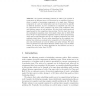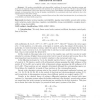412 search results - page 4 / 83 » Completion for Multiple Reduction Orderings |
FSTTCS
2007
Springer
14 years 1 months ago
2007
Springer
We consider scheduling problems in which a job consists of components of different types to be processed on m machines. Each machine is capable of processing components of a singl...
KBSE
2009
IEEE
14 years 2 months ago
2009
IEEE
—Abbreviation Completion is a novel technique to improve the efficiency of code-writing by supporting code completion of multiple keywords based on non-predefined abbreviated inp...
SIAMCO
2008
13 years 7 months ago
2008
We analyze controllability and observability conditions for second order descriptor systems and show how the classical conditions for first order systems can be generalized to this...
TASLP
2008
13 years 7 months ago
2008
Abstract--The problem of noise reduction using multiple microphones has long been an active area of research. Over the past few decades, most efforts have been devoted to beamformi...
ICC
2000
IEEE
13 years 11 months ago
2000
IEEE
Abstract—We describe two classes of simple, effective techniques for reducing the average optical power requirement in intensity-modulated optical systems using multiple BPSK or ...



